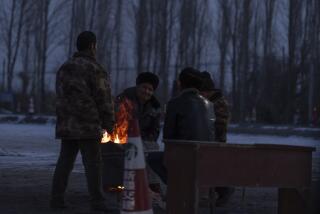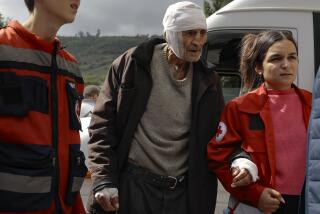Refugees in Primitive Camp, Soviets Say
- Share via
MOSCOW — Ethnic rioting that has killed about 100 people in the Uzbekistan republic has driven nearly 15,000 refugees into a camp where living conditions are so primitive that women give birth on the ground, Soviet media said Sunday.
“The most explosive situation is here, in the refugee camp,” for Meskhetians (minority Turks), said a report on the television news program “Vremya.”
The military newspaper Red Star said mobs of intoxicated residents continue to direct violence against Meskhetians in the republic’s Fergana region.
“The green colors of Fergana do not cover the remains of burned-out homes that belonged to Turks not so long ago,” the newspaper said. “In some places of the region, clouds of smoke are visible. Numerous are the crowds made up of drunks and people high on drugs.”
Most of the violence in the region, about 1,500 miles southeast of Moscow, has been directed at the Meskhetians, a minority group uprooted by dictator Josef Stalin in 1944 from its homeland in Soviet Georgia and forcibly resettled in the Soviet East.
Red Star said that about 100 people were killed in the first days of the weeklong rioting and about 1,000 other people were wounded. According to Red Star, 136 Interior Ministry soldiers have been injured since the disturbances began.
Outside the city of Fergana, the government newspaper Izvestia said, about 14,500 people who have fled their homes are housed under guard in a refugee camp in blistering heat.
“Conditions are hard in the camp,” it said. “Some of the 20 babies born in the past week were delivered on the bare ground.”
According to Izvestia, a 200-bed field hospital has been set up at the camp to treat wounded Turks who left hospitals in Fergana because they were afraid to stay there.
But Izvestia quoted Lt. Col. N. Usmanov of the Interior Ministry as saying that about 20 of the refugees have begun a hunger strike demanding to be taken out of Central Asia altogether.
A spokesman for the refugees, interviewed on “Vremya,” demanded “immediate evacuation . . . (to) save our people.”
Red Star said the decision has been made to evacuate women and children from the camp and that 400 people have already been airlifted to a children’s camp operated by the Interior Ministry.
From Sunday’s Soviet press, it was clear that the violence was continuing despite the presence of 9,000 Interior Ministry troops sent to restore order. But the reasons for the outburst, which officials said began as an ethnic dispute between Turks and the dominant native population, the Uzbeks, were still unclear.
Red Star quoted Col. E. Nechaeyv, deputy chief of the political department of Interior Ministry troops, as saying: “We think that the extremists’ actions are guided by interested leaders with mercenary goals, which they use vile methods to achieve.”
Interior Minister Vadim V. Bakatin on Saturday blamed the rampage on outside agitators who came pouring into the valley in cars and trucks. He called them opponents of President Mikhail S. Gorbachev’s reforms, which have brought a crackdown against corruption in Uzbekistan.
“One thing is absolutely clear,” Bakatin told the Soviet Culture newspaper. “Evil forces that want to destabilize the situation . . . are behind these events.” But he said he could not yet determine who was responsible.
At Kimyagar settlement, five miles from the city of Kokand, young people who arrived in cars smashed kiosks and shop windows on Saturday, attacking people who tried to stop them, the labor daily Trud said.
It said the young rioters were detained and some admitted that on the eve of their attack, instigators from Kokand came and threatened to set their homes ablaze if they did not set out for Kimyagar.
But the Trud report did not explain why the instigators wanted the Turks attacked.
More to Read
Sign up for Essential California
The most important California stories and recommendations in your inbox every morning.
You may occasionally receive promotional content from the Los Angeles Times.













